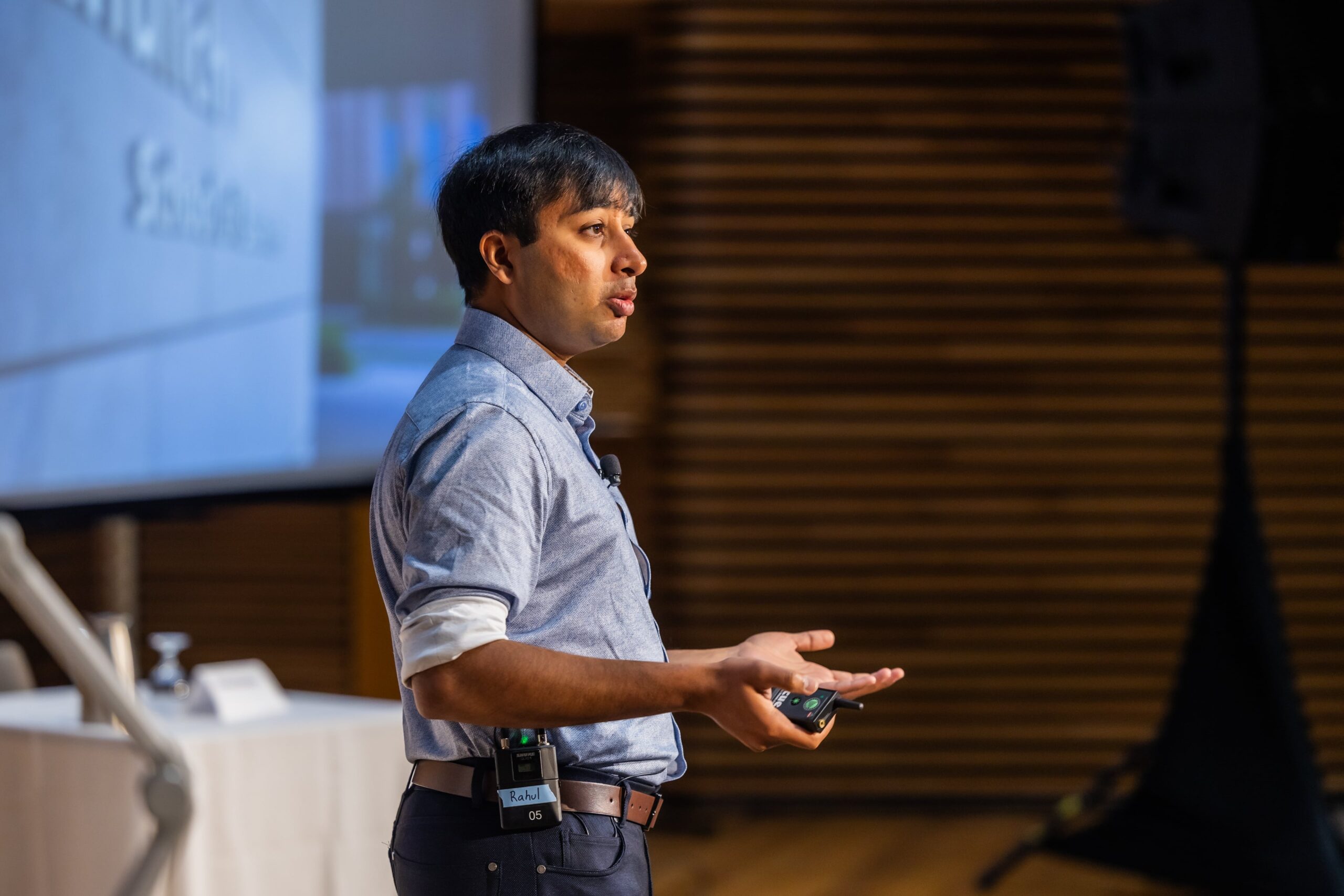Business
Canada Urged to Enhance Support for Dual-Use Defence Technologies

A recent panel discussion at York University highlighted the urgent need for Canada to bolster its support for dual-use defence technology. Leading the conversation was Rahul Goel, CEO of NordSpace, who shared insights from his journey in establishing Canada’s first commercial space-launch capability. This initiative aims to serve both military and civilian purposes.
During his keynote address on October 1, 2023, Goel detailed how he founded NordSpace after years of preparation and independent ventures. He emphasized that his company’s success is built on $10 million of his own funds, without reliance on external investors or government grants. This approach, he believes, allows for greater control over the company’s direction and fosters innovation.
Following Goel’s presentation, a panel discussion focused on the broader challenges facing Canadian firms in the dual-use technology sector. The event was co-hosted by York University and the Icebreaker, an innovation network supporting Canadian defence.
Sam Macdonald, co-founder of Deep Trekker Inc., a manufacturer of submersible remotely operated vehicles, expressed concerns about the lack of non-dilutive capital available for Canadian startups. She criticized the government for not providing adequate support, stating, “There is no reason in the world Rahul should be bootstrapping a rocket company. Absolutely not. It’s shameful that our government is not helping you in a more meaningful way.”
Macdonald’s own experience reflects the challenges faced by Canadian tech companies. After founding Deep Trekker without external funding, she oversaw its acquisition in 2022 by Halma PLC, a British conglomerate. Macdonald noted a stark contrast in interest from potential buyers, with only one Canadian company expressing interest—at the lowest valuation.
Both Goel and Macdonald’s experiences illustrate the difficulties within Canada’s dual-use technology ecosystem. While their stories inspire emerging entrepreneurs, they also underscore the rigorous requirements for operating in the defence sector. Goel pointed out that pursuing dual-use opportunities involves navigating a complex landscape of approvals, including security clearances and controlled goods authorization. He remarked, “This is intense; building a defence company. Dual-use is not just some switch that you flick.”
The panelists called for a paradigm shift in how the Canadian government and investors approach support for tech companies. Mark Maybank, co-founder of Maverix Private Equity, proposed the creation of a sovereign wealth fund. This fund could consolidate existing resources and provide clear, non-dilutive capital to foster homegrown innovation, rather than relying solely on grants and subsidies.
Maybank warned that without significant changes, Canada risks losing its technological edge. He stated, “If Canada just follows its historic path of pouring money at the problem, picture it as a giant sieve, and all that money flowing straight out of Canada.”
The panel also stressed the importance of viewing a robust dual-use technology sector as a critical component of national security and economic growth. Burkard Eberlein, a professor at the Schulich School, emphasized that agility in technology development is vital in a rapidly changing global landscape. He urged policymakers to prioritize this sector as a key area for investment.
As Canada navigates its future in defence technology, the insights shared at York University reflect a growing consensus on the need for a more supportive environment for innovation. By addressing funding gaps and fostering collaboration between government and industry, Canada can better position itself in the global defence landscape.
-

 Education3 months ago
Education3 months agoBrandon University’s Failed $5 Million Project Sparks Oversight Review
-

 Science4 months ago
Science4 months agoMicrosoft Confirms U.S. Law Overrules Canadian Data Sovereignty
-

 Lifestyle3 months ago
Lifestyle3 months agoWinnipeg Celebrates Culinary Creativity During Le Burger Week 2025
-

 Health4 months ago
Health4 months agoMontreal’s Groupe Marcelle Leads Canadian Cosmetic Industry Growth
-

 Science4 months ago
Science4 months agoTech Innovator Amandipp Singh Transforms Hiring for Disabled
-

 Technology4 months ago
Technology4 months agoDragon Ball: Sparking! Zero Launching on Switch and Switch 2 This November
-

 Education4 months ago
Education4 months agoRed River College Launches New Programs to Address Industry Needs
-

 Technology4 months ago
Technology4 months agoGoogle Pixel 10 Pro Fold Specs Unveiled Ahead of Launch
-

 Business3 months ago
Business3 months agoRocket Lab Reports Strong Q2 2025 Revenue Growth and Future Plans
-

 Technology2 months ago
Technology2 months agoDiscord Faces Serious Security Breach Affecting Millions
-

 Education4 months ago
Education4 months agoAlberta Teachers’ Strike: Potential Impacts on Students and Families
-

 Education3 months ago
Education3 months agoNew SĆIȺNEW̱ SṮEȽIṮḴEȽ Elementary Opens in Langford for 2025/2026 Year
-

 Science4 months ago
Science4 months agoChina’s Wukong Spacesuit Sets New Standard for AI in Space
-

 Business4 months ago
Business4 months agoBNA Brewing to Open New Bowling Alley in Downtown Penticton
-

 Business4 months ago
Business4 months agoNew Estimates Reveal ChatGPT-5 Energy Use Could Soar
-

 Technology4 months ago
Technology4 months agoWorld of Warcraft Players Buzz Over 19-Quest Bee Challenge
-

 Business4 months ago
Business4 months agoDawson City Residents Rally Around Buy Canadian Movement
-

 Technology2 months ago
Technology2 months agoHuawei MatePad 12X Redefines Tablet Experience for Professionals
-

 Technology4 months ago
Technology4 months agoFuture Entertainment Launches DDoD with Gameplay Trailer Showcase
-

 Technology4 months ago
Technology4 months agoGlobal Launch of Ragnarok M: Classic Set for September 3, 2025
-

 Top Stories3 months ago
Top Stories3 months agoBlue Jays Shift José Berríos to Bullpen Ahead of Playoffs
-

 Technology4 months ago
Technology4 months agoInnovative 140W GaN Travel Adapter Combines Power and Convenience
-

 Science4 months ago
Science4 months agoXi Labs Innovates with New AI Operating System Set for 2025 Launch
-

 Technology4 months ago
Technology4 months agoNew IDR01 Smart Ring Offers Advanced Sports Tracking for $169










